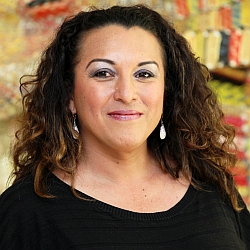
The right to life for people living with HIV is the same as for anyone else – UNAIDSA conversation with Erika Castellanos, a transgender woman living with HIV from Belize.
Erika Castellanos is a transgender woman living with HIV from Belize engaged in advocacy at the local, regional and international levels. She is currently serving as the Vice-Chair of the Global Network of People Living with HIV (GNP+) and is the Director of Programmes at GATE. Before joining GATE, Erika served as the Executive Director of the Collaborative Network of Persons Living with HIV, Belize. Since 2016, she has been a member of the Communities Delegation to the Board of the Global Fund to Fight AIDS, Tuberculosis and Malaria and a member of the International Group of Trans Women and HIV. She served as a delegate from Latin America and the Caribbean to the UNAIDS Programme Coordinating Board.
What does the right to health mean to you?
For me, the right to health is the full enjoyment of the highest possible standard of health. It means to be able to enjoy a state of complete physical, mental and social well-being, which is not just the absence of disease. It is a fundamental right that all people are entitled to, regardless of their sex, sexual orientation, gender identity, economic situation, profession, education or the country they live in.
My right to health includes being able to access services without fear of discrimination — affordable and high-quality services that are client-centred and based on the needs of the individual. It means that I have access to gender-affirming care, antiretroviral therapy, diagnostic laboratory tests and mental health services, all within an environment free from discrimination and judgement.
What is preventing people living with HIV from being able to exercise their right to health?
People living with HIV are prevented from exercising our right to health owing to social, political and institutional discrimination. Key populations who are also living with HIV experience those barriers much more and with more impact.
In many parts of the world, we are criminalized and accessing health services can lead to outing ourselves. We are forced to live in an underground world by hate and stigma and fear of the unknown. Health services are designed and geared towards cisgender heterosexual people and are not welcoming to us.
What more can be done to make sure that all people living with HIV can access services?
Many things can be done to improve our access to services. Services should be designed and implemented by our communities and we need evidence-informed services that meet our needs. There needs to be decriminalization of key populations and decriminalization of HIV. Services should be client-driven and client-lead, instead of doctor-led.
In a nutshell, empowered people and communities must be able to demand and deliver services in partnership with nonjudgemental, discrimination-free health systems within a legal and policy environment that sees us as human beings irrespective of our HIV status, sexual orientation, gender identification, drug use or profession.
Do you think the situation has improved at all over the past 20–30 years?
The situation has certainly improved over the past 20–30 years, but in some countries, instead of moving forward, things are going backwards when it comes to the enjoyment of human rights by people living with HIV. This is not the time to celebrate and pat us on the back, it is the time to redouble efforts and make sure that every single person in the world can fully enjoy the right to health. As a transgender woman living with HIV for 22 years, I have seen the changes throughout the years and I am happy to say that today we live in a better world. In a world where I do not have to hide my status, in a world where being HIV-positive does not equal death. In a world where I can now plan for a future and in which I have allowed myself to love and be loved.
GNP+ is the global network for and by people living with HIV. GNP+ works to improve the quality of life of all people living with HIV by advocating for and supporting fair and equal access to treatment, care and support services for people living with HIV around the world.
GATE is an international organization working on gender identity, sex characteristics and, more broadly, on bodily diversity issues. GATE works on supporting transgender, gender diverse and intersex movements by producing and making available critical knowledge, promoting their access to organizational resources and advocating with them to make human rights a lived reality.
Read more in the UNAIDS’ report Right to Health.
